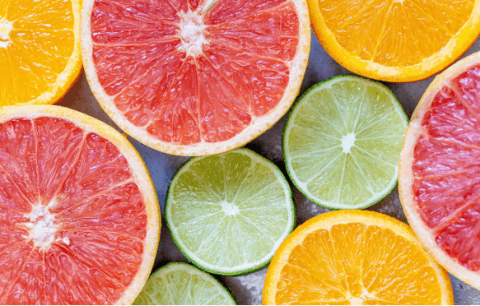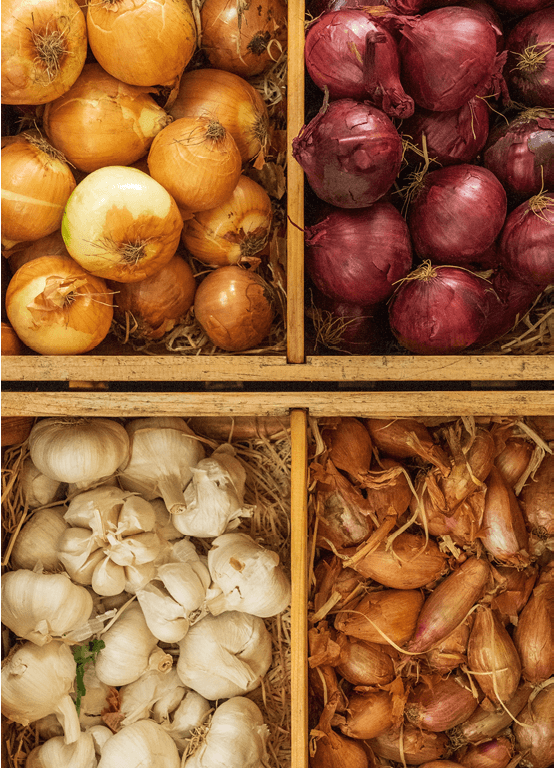If you’re unsure about whether any other foods are safe for cats, please speak to your vet.
Examples of poisonous foods - it’s important to avoid chocolate and citrus in cats



Chocolate contains substances called methylxanthines that make chocolate bad for cats (and dogs too). If cats eat chocolate, methylxanthines such as theobromine and caffeine can cause chocolate poisoning. Symptoms of chocolate poisoning in cats include vomiting, diarrhoea, abnormal heart rhythms, muscle tremors, elevated body temperatures, agitation, abdominal pain and – in severe cases – seizures or death.
Sensitivity to methylxanthines varies between animals. The darker the chocolate the more toxic it is to cats, as dark chocolate contains more methylxanthines than milk or white chocolate. Seek veterinary advice if your cat ate chocolate, even if your cat only licked the chocolate.
Onions and garlic are used extremely commonly in food prepared for humans, however both onions and garlic are bad for cats. Onion and garlic are both members of the Allium family. Other Allium species, such as spring onions, chives, leeks and shallots can also be toxic to cats.
Avoid preparing onions or garlic for cats. Cats are particularly sensitive to Allium species toxicity, and garlic or onion toxicity in cats can be extremely dangerous. Garlic is especially toxic to cats. You should also make sure you don’t let your cat eat onions.
If your cat eats garlic or onions, especially in highly concentrated forms like onion or garlic powder, they can sustain damage to their red blood cells. Garlic or onion poisoning in cats can lead to a form of anaemia (lack of red blood cells) called Heinz body anaemia. Garlic or onion toxicity in cats can cause lethargy, weakness, rapid heart rate, rapid breathing, jaundice, a reduced appetite, collapse or even death.
Cat owners may wonder: can cats eat grapes? The answer is no. There are reports of these foods causing toxicity in cats, as there are in dogs. Therefore, grapes, raisins and sultanas are considered toxic for cats.
While the actual poisonous compound within grapes and raisins has not been identified, cats can potentially develop gut upsets or kidney damage following ingestion. Any amount can be toxic to cats. If a cat ate grapes, potential signs of toxicity include lethargy, vomiting, diarrhoea, increased thirst, increased urination, reduced appetite and collapse.
Grapes can also be bad for cats in other ways: for example, they can act as choking hazards due to their size and shape. Additionally, they aren’t appropriate nutritionally for cats, who are carnivores by nature.
Alcohol for cats is a big no-no, whether it’s a cat drinking alcohol like beer or eating foods containing alcohol. As little as one teaspoon of alcohol can be toxic to cats. Signs of alcohol poisoning include disorientation, vomiting, diarrhoea, tremors, breathing difficulties, coma and death.
Uncooked dough containing yeast can be toxic to cats too. It can expand in the stomach after ingestion, causing bloating and gut upset. Raw yeast can also ferment sugars to alcohol in the stomach, resulting in alcohol poisoning.
Despite the stereotype of cats lapping from saucers of milk, dairy products aren’t ideal for cats. Adult cats lack the enzyme lactase which allows the body to break down the milk sugar lactose. Ingestion of dairy products can cause gut upset – namely, vomiting, diarrhoea, reduced appetite and abdominal pain.
Can cats eat lemons, oranges, or mandarins? The answer is no. Cats and citrus do not mix. Cats typically dislike citrus and will actively avoid it. However, to be safe it is best to avoid preparing anything containing lemon, orange, or mandarin for cats.
Cats are sensitive to the citric acid and essential oils found in citrus plants. These compounds are mainly found in the peel, seeds, leaves, and stems, and less so in the flesh of the fruit.
Avoid feeding cats lemon and other citrus fruits. Ingestion of large amounts of citric acid or citrus essential oils can affect the nervous system, potentially causing tremors, seizures or death.
Can cats eat raw potatoes? The answer is no. Raw or green potatoes can cause severe toxicity in cats due to a substance called solanine which can affect the gut or nervous system. While cooked potatoes are considered less toxic, they can also contain solanine, so it’s safest to avoid feeding cats potatoes altogether.
Being obligate carnivores, cats may also struggle to digest the high levels of carbohydrates in potatoes. Raw potatoes are also difficult to digest, which can cause abdominal bloating and discomfort in cats.
If a cat ate raw potato, potential signs of toxicity may include: lethargy, depression, vomiting, diarrhoea, abdominal pain, abnormal heart rhythm, unsteady gait, excessive drooling, jerky eye movements, uneven pupil size, muscle tremors, stiff limbs, seizures, coma or death.
If you’re unsure about whether any other foods are safe for cats, please speak to your vet.
Examples of poisonous foods - it’s important to avoid chocolate and citrus in cats



The signs and symptoms of food poisoning in cats vary depending on the toxin. Harmful foods for cats may cause things like:
Gut upset
Signs of gastrointestinal upset include vomiting, diarrhoea, reduced appetite, abdominal pain and lethargy.
Kidney damage
Signs of kidney damage include increased thirst, increased urination, lethargy, reduced appetite, vomiting, diarrhoea, and – in severe cases – mouth ulcers, seizures and collapse.
Neurological signs
If a toxin affects the nervous system, signs can range from muscular problems (e.g., tremors, weakness, rigidity) to brain dysfunction (e.g., depression, stupor, unsteady gait, drooling, uneven pupils, seizures and coma).


If you are concerned your cat has eaten something poisonous, then you should contact a veterinarian. Some toxins, if identified soon enough, can be treated by a veterinarian by inducing vomiting. However, certain poisons can cause more damage if vomiting is induced, so it’s important not to try this at home.
If the pet has absorbed some of the toxin, they may need to be treated with intravenous fluids (a drip), specific antidotes and/or supportive medications to treat signs like nausea and abdominal pain.
FEL-0045-2023
RELATED ARTICLES


Unsure what to feed your cat? Discover a variety of human foods you can add to your cat’s diet. Click here to learn more!


Parasites may be small, but they can be a big problem for your cats. Protect your cat with NexGard® SPECTRA Spot-On for Cats. Click to find out more!
Want to know more about tapeworm in cats? Read more on tapeworm symptoms in cats and how to treat and protect your cat.
Copyright and Trademark Notice
NEXGARD SPECTRA®, NEXGARD®, HEARTGARD30® and PARAGARD® are registered trademarks of the Boehringer Ingelheim Group.
©2021-2023 Boehringer Ingelheim Animal Health Australia Pty. Ltd. All rights reserved. PET-0228-2022 PET-0203-2023